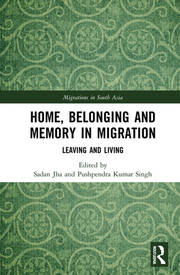
Edited by Sadan Jha and Pushpendra Kumar Singh and published by Routledge in 2022, , Home, Belonging and Memory in Migration: Leaving and Living offers a peek into the multifaceted worlds orchestrated by migrants within and beyond India. This volume neither exceptionalises nor normalises migration. Instead, it recognises the migrants’ agency and subjectivity as well as positions them within larger intertwined social structures. It prioritises the migrants’ experiences and perspectives through a framework on belongingness, home/s and memories. To do so, Jha and Singh divide this volume into four subsections and fourteen chapters, each exploring the themes of labour, gender, folk and urbanism respectively.
The first section, ‘Labouring to Freedom’, studies workers’ subjectivities. One of the essays is by anthropologist Sohini Sengupta. It wonders how ex-ploughmen from Borasambar, Odisha – now seasonal migrants – articulate the changes, or the lack of, in their socio-economic lives. In response, Sengupta unravels their emphasis on a seemingly “improved present” (p. 84) to reveal distinct aspirations and actualisation of ‘freedoms’; such that it enables them to navigate the unfamiliar terrains of capitalist wage contracts.
The following section, ‘Engendering Migration’, centralises women’s agency. Take Anindita Chatterjee’s chapter for instance. Through the narratives of four migrant domestic workers across Noida, Delhi and Kolkata, she observes the myriad ways these women navigate natal (families they leave behind) and adopted (families they work for) kin networks. Here, Chatterjee teases out the tensions between ‘choice’ and ‘agency’ through a critical analysis of how migrant domestic workers reminisce yet (re)build ‘home/s’ across geographic and affective landscapes.
The third section of this volume, titled ‘Memory and Longing’, captures expressions of mobility in cultures. This is best encapsulated by Praveen Kumar Jha’s essay on birahā,the trans-continental music genre on separation and movement. It is shared between India and the Caribbean Islands owing to the colonial migration of indentured labourers. Here, Jha studies two trends: first, the migration, retention and evolution of a “musical heritage” (p.214) across countries as well as castes; and second, its consequent production of social identities.
The last section, ‘Negotiating the City Space’, locates migration within the socio-historical particularities of a city. One such essay is by political scientist Garima Dhabhai. Through an ethnography on post-Partition Sindhi refugees in Jaipur, Rajasthan, she traces their shifting “re-signification” (p.235) between sharnarthi (refugee) and purusharthi (hard-working person) by unpacking the dynamic urban developments within the walled city. One such state initiative is the turn towards ‘conservation of heritage’. Dhabhai problematises the same to underline its implicit assumptions of ‘authenticity’ and the ways it configures exclusion into spatial arrangements.
This volume makes many important contributions. Firstly, its analysis goes beyond the 1947 Partition and Punjab – a time and region that otherwise dominates the discourse on affective mobilities within the subcontinent. Secondly, it complicates binaries between ‘home’ and ‘somewhere else’, temporal and spatial, sedentary, and nomadic, urban and rural. Amita Bhide and Kalyani Vartak’s chapter on ‘simultaneity’ is an excellent example. It presents a case on “circulatory urbanism” (p.195) embodied by the Konkani migrants in Mumbai. Their fluid and dynamic migration metamorphose both their villages and the city. Thus, making the migrants ‘cosmopolitan citizens’ and the difference between their ‘origin’ and ‘destination’ redundant. This volume also deconstructs the recurring figure of an ‘economic’ migrant. Instead, it roots the causes and consequences of migration in affect, morality, kinship, and gender. Lastly, it scrutinises migration not just as a phenomenon but as a body of knowledge – a “method” (p.270). The authors subtly but surely uncover the intricate links between ‘being’ and ‘knowing’ migrants. Hence, necessarily prodding us to scrutinise our positionality and the ways it seeps into our scholarship.
This volume achieves a great feat. Still, like all good work, there are some areas where it falls short. Firstly, its attempt at undoing binaries inadvertently creates a new one – ‘leaving and living’. This theoretical lens appears almost self-contradictory. It assumes a fixed point and place of departure, both of which have been disproved by the featured scholars. The editors too note that ‘leaving’ and ‘living’ are neither linear nor mutually exclusive. “Living defined [the migrants],” Singh writes in his chapter, “leaving did not.” (p.79) Why then assume ‘leaving’ as an axis at all? How long does one have to ‘stay’ for their mobility to count as a ‘leave’? What do we make of those who never ‘leave’ because they have never ‘stayed’? These are queries this framework provokes but does not engage with. Moreover, the volume does not undermine the state as promised. Instead, it limits itself to im/mobilities within India, reifying ‘internal’ migration as a category and the nation as the border. The volume could have also delved more deeply into the intergenerational aspects of migration – something that the authors acknowledge but do not address. Lastly, the book could have also done away with the subsections considering how frequently – inevitably – the themes of labour, gender and urbanism overlapped across the chapters.
Nevertheless, Home, Belonging and Memory in Migration: Leaving and Living is a bold step towards ‘demigrantising’ migration studies and ‘migrantising’ social sciences at large (p.4). Its merit lies in the critical questions it raises. Jha and Singh offer only a peak. Thus, hinting at the endless possibilities – across geographical, emotional and intellectual realms – yet to be unveiled.
***
Shreya U. K. is a Research Associate at Georgetown University.